 Petzlover
PetzloverLowchen is originated from Germany but Tweed Water Spaniel is originated from United Kingdom. Lowchen may grow 27 cm / 10 inches shorter than Tweed Water Spaniel. Lowchen may weigh 24 kg / 52 pounds lesser than Tweed Water Spaniel. Both Lowchen and Tweed Water Spaniel has almost same life span. Both Lowchen and Tweed Water Spaniel has same litter size. Both Lowchen and Tweed Water Spaniel requires Moderate Maintenance.
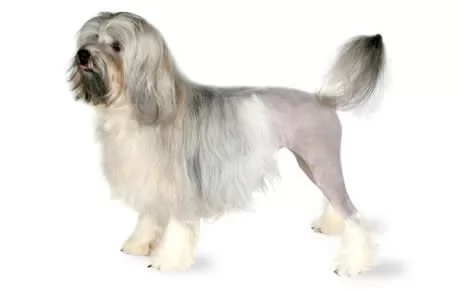 Known as the Little Lion Dog, the Lowchen is considered by some registries as a toy dog and by the American Kennel Club as a non-sporting dog.
Known as the Little Lion Dog, the Lowchen is considered by some registries as a toy dog and by the American Kennel Club as a non-sporting dog.
Nobody seems too certain about the true origin of the dog but most records seem to suggest it originates from Germany, France or Holland.
He was bred to catch rats and mice and his history goes way back to 1442, with images of him being found in engravings and paintings. People think he may be related to the Bichon Frise.
His history shows that apart from being used to catch vermin he was also a companion dog to the wealthy. A breeding program for the dog was started in 1944 and they were later imported to Britain in the late 1960s. The dog was given Kennel Club recognition in the UK in 1971, also appearing in America in 1971 with The Lowchen Club of America being formed.
The Tweed Water Spaniel is extinct. Fortunately, we have some beautiful dogs that come from this dog. It is involved in bringing about the Golden Retriever. They were athletic dogs from Berwick-upon-Tweed.
It was in 1816 that Richard Lawrence wrote of the origins of the Tweed Water Spaniel which is thought to have come from the Newfoundland dog. It is believed that huntsmen used these dogs to retrieve the ducks and geese they shot. This purebred dog wasn’t recognized by the American Kennel Club or the FCI.
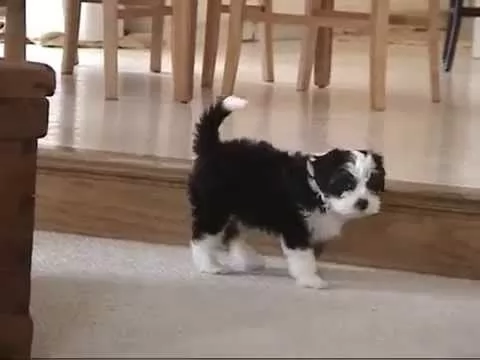 The Lowchen is a small dog but robustly built and stands at between 25 – 33 cm in height and weighs anything from 4 – 8 kg.
The Lowchen is a small dog but robustly built and stands at between 25 – 33 cm in height and weighs anything from 4 – 8 kg.
He has a long coat which is available in a number of colors - cream, white, grey, black, silver and bi-colored. The single coat isn’t like that of the Bichon Frise, thin and fluffy, but is much thicker, silky and wavy and sheds minimally. People love snipping the long coat cut so that the dog looks like a small lion, short over the body and with a mane, with some hair left around the ‘ankle’ parts of the legs.
The tail is also sheared and left with a pom-pom look. People look at him as an ideal pet as he doesn’t shed much and is looked upon as being a hypoallergenic dog.
He has a wide muzzle and broad, flat skull. The ears are floppy with fringing, the eyes dark, round and intelligent looking. The litter size of this dog is is usually between 3 and 6 puppies.
Intelligent, bright, outgoing and affectionate, you won’t find any aggression in this cute little dog unless the owners have treated him so badly that he wants to be aggressive.
He is such an amicable little pet that he won’t cause you any trouble – he just wants to be your friend. He is a social dog, but can be quite timid when introduced to new people.Socialization and training will do wonders for him and give him some confidence.
He just loves receiving attention and is also prepared to give a lot of attention too. Although he can adapt easily to life in the city or the countryside, he wouldn’t like his owners being at work all day and leaving him alone hour after hour. He is gentle with his human family and sees to it that he gets on well with children as well as pets in the home.
The Tweed Water Spaniel had a curly liver-colored coat with a long feathery tail and medium-sized floppy ears. It is thought that he was a large dog standing at between 50 to 60cm in height and weighing between 25 and 32kg.
The Tweed Water Spaniel, regarded as a moderate shedder, would have required being brushed from time to time.
The Tweed Water Spaniel had so many wonderful characteristics that made him a splendid family pet. He was smart and able to learn basic commands. He was also very playful and would have made a robust, playful friend for children.
They made gentle, loyal companions for their human family and wee able to get on well with other pets in the home. They would have got on well with other pets in the home too and it is believed that they were amicable enough to have been suited as a therapy dog.
They made good watchdogs too, being active and alert, just loving the outdoors. They’re well suited to life in the country or a home with a big garden and wouldn’t like to be cooped up on a small property in the city.
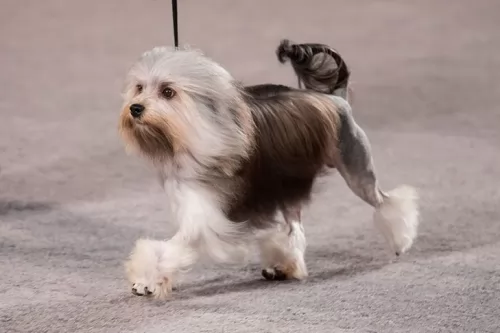 The Lowchen is sure to make anyone a splendid pet as he is friendly, playful, loving and loyal. He is such a good natured pet and will make a wonderful companion, being able to get on well with children and pets in the home.
The Lowchen is sure to make anyone a splendid pet as he is friendly, playful, loving and loyal. He is such a good natured pet and will make a wonderful companion, being able to get on well with children and pets in the home.
He is energetic too and will love to be outside playing games or joining you on a walk. Those who have had the Lowchen as a pet haven’t been disappointed as they all agree that he makes the most amazing family companion.
Intelligent, courageous and friendly, it seems such a pity that the Tweed Water Spaniel is extinct because he seemed to have been a super dog.
Luckily we have dogs such as the Golden Retriever that remind us of what a good family pet he was.
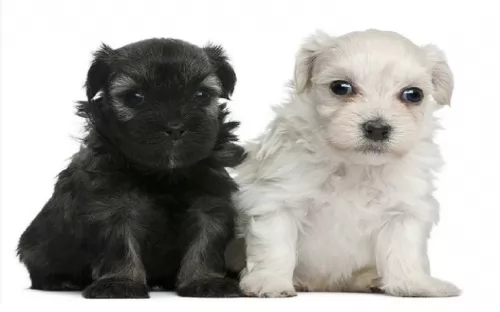 The Lowchen is a healthy dog breed so you aren’t going to be spending too much money with him at the vet. Some health concerns with this particular dog breed are cataracts and patellar luxation.
The Lowchen is a healthy dog breed so you aren’t going to be spending too much money with him at the vet. Some health concerns with this particular dog breed are cataracts and patellar luxation.
It can be so sad witnessing your dog’s bright, alert eyes clouding over. Dogs have clear lens, but cataracts, while not painful, can impair vision and actually lead to complete vision loss. As the eye disease progresses, the lens can become completely opaque.
This occurs when the kneecap of the dog is dislocated from its normal position. You’ll see your dog holding up his hind leg every now and then. It can only be returned to its normal position once the quadriceps muscles of the dog relax.
This is a common knee joint problem in dogs and it can lead to arthritis. He will need to get to the vet.
Because this dog is extinct and because no health records were kept, it is assumed that he would have had the same health issues as a Golden Retriever. Typical health issues of this dog would include hip dysplasia, obesity, cardiomyopathy.
This is a preventable disease in dogs, and if dog owners only knew what damage they do by allowing their dogs to become obese. Certainly, obesity shortens a dog’s life.
It is mind-boggling to realize that scientific evidence tells us that fat tissue is biologically active, secreting inflammatory hormones and also putting stress on the dog’s joints. Obese dogs develop an increased risk for cancer, diabetes and heart disease.
Dilated cardiomyopathy is a disease of the heart muscle characterized by an enlarged heart. The heart doesn’t function properly with the ventricles becoming enlarged. The muscle wall of the heart becomes thinner and this causes the heart to lose the ability to pump blood to the rest of the body.
Fluid can accumulate in the lungs. This can all lead to congestive heart failure. Your dog will battle to breathe, be panting and coughing, have an extended abdomen and may even collapse.
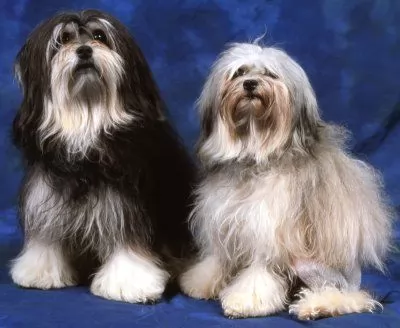 Because your Lowchen is a bright, happy companion dog you want to ensure that you look after him well to ensure his ongoing wellbeing.
Because your Lowchen is a bright, happy companion dog you want to ensure that you look after him well to ensure his ongoing wellbeing.
The single coat is long and you will need to brush him regularly to keep it looking good. If brushing becomes too hectic, you can have him sheared at a professional dog groomer.
Check him over for fleas and ticks while brushing him.
Feel all over his body for the emergence of new lumps.
Clip his nails to ensure they don’t grow long so that they hook on things and tear his flesh.
Check the inside of his ears to make sure there is no sign of redness and ear infection. This can drive your pet mad with the itching. The ears need to be kept clean, as do the teeth and both these can be done for you at professional dog groomers.
Every dog requires exercise and your Lowchen will need games and walks to keep him fit, to ward off obesity and to provide him with something to look forward to.
Make sure to feed your pet wholesome food as good quality food promotes good health and longevity. Give your Lowchen the best quality kibble there is and try and mix in some homemade cooked chicken, brown rice, pasta and cooked or raw vegetables every now and then just to add some tasty variety to your pets diet. Make sure he always has access to fresh, cool water.
Make sure your Lowchen has a warm, dry comfy spot to sleep, and ensue that when he’s outside he has shade to lie down in.
The Tweed Water Spaniel had floppy ears and as a water dog, he may well have had ear infections in his day. One wonders if dog owners of that time were aware of the need to have the inside of the dog's ears clean and dry.
The Tweed Water Spaniel would have needed to have his eyes checked too. Pus in the eyes could indicate the dog wasn’t well.
The Tweed Water Spaniel would have required a lot of exercise and would have loved long walks and hikes. He wouldn’t need an invitation to go swimming and if you threw a stick or ball into the water, he’d be right there, jumping right in.
If you were a person that thrived on an active life this dog would have been for you.
Nobody really knows what the Tweed Water Spaniel would have eaten in the 19th century when he was around. He’s the kind of dog you’d have to be careful with as he could put on weight easily.
If he were around today, you’d give him a high quality commercially manufactured food that was designed for large, active dogs. No doubt in those days, the owners gave the dog scraps off the table.
Today if you wanted to give your dog home-made food, you’d stick to healthy foods such as boiled chicken, brown rice or pasta and some healthy vegetables such as spinach, carrots and sweet potatoes.
Puppies would have required 4 bowls of food a day while the adult dog would require 2 meals a day.